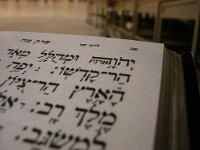 This is a Guest Column by Twin Cities Jewish Educator Sean Herstein.
This is a Guest Column by Twin Cities Jewish Educator Sean Herstein.
I have always enjoyed reading but I was never a big fan of reading books that my teachers or professors required for class. Even though the topics were interesting and I generally enjoyed my studies, something about the notion of “requirement” took the pleasure of reading away. In school, I either read these books begrudgingly or I simply left them on the shelf to be appreciated at a later date.
The whole idea of Yom Kippur arises within me some of the very same feelings. I feel that there is something artificial and forced about setting aside one day every year for us to admit our mistakes and ask forgiveness from others. This should be done every day! Just feeling that I am “required” to sit in synagogue, pray with more intensity than normal, and pour out my soul to God (or maybe just acknowledging my soul’s existence to myself) makes me feel less motivated to do just that. Yet, this is what Yom Kippur asks us to do.
As a Jewish educator, I feel that much of my job is to present multiple options for finding meaning in our rich tradition. If the traditional understandings and teachings lack meaning, perhaps one of the multiple alternative interpretations will be a better fit. Similarly, if the new-age, trendy approaches seem inauthentic or inappropriate, maybe taking a fresh look at a classic text will awaken passion or, at least, appreciation for our classic values and beliefs.
In this vein and for your consideration, I present a number of ways to approach Yom Kippur and find meaning in the day.
- By asking us to confess specific mistakes that we have made over the past year, Yom Kippur challenges us to take stock of the person each of us is and the person each of us wants to be. What is one way you can improve yourself? Think of a bad habit, a strained relationship, or a priority that is not being given necessary attention. Then, set aside the time and resources to make real progress.
- By asking us to attend services in the community, Yom Kippur challenges us to engage in some very personal introspection and prayer despite the fact that we are surrounded by others who may not have our own best spiritual interest in mind (talking loudly, wearing strong fragrances, etc.). What would your ideal meditation or prayer space look, sound, and feel like? Find a way to appreciate the value of community while looking within to find an internal temple where you can do the real work of the day.
- By asking us to refrain from earthly pleasures like sustenance and romance, Yom Kippur challenges us to truly appreciate our relative wealth and comfort. How can you help some of the many people who unfortunately know what it is like to really go hungry? Make a plan to help them through volunteering or making a donation.
- By asking us to think about our mortality through its liturgy, Yom Kippur challenges us to live life to the fullest. What did you want to accomplish this year that you have had to put off doing? Commit yourself and do it.
As the saying goes, may you have an easy fast. But more importantly, may we all have a meaningful Yom Kippur . . . whether we fast or not.
(Photo: yosefsilver.com)












